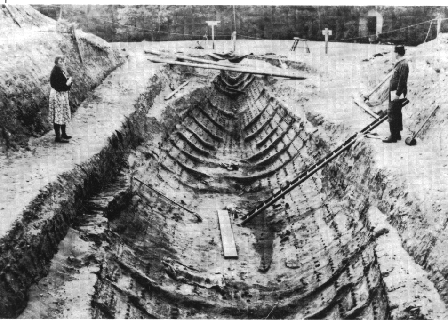- This is the one I will quiz you on:
- Iberians - from Spain-Portugal
- Celts - the "Irish" peoples
- Romans - from Italy
- Anglo-Saxons - from Germany (Angles, Saxons, Jutes)
- Vikings - from Scandinavia (Denmark and Norway)
- Normans - from France (originally from the north; that's why it's Nor(th)man)
- This one is helpful, but I will not quiz you on it:
Anglo-Saxon Centuries (thanks to Prof. Michael Drout, an Old English scholar at Wheaton College) - MCGVR (a mnemonic based on the old television show MacGyver ).
- Migration (500-600 AD) - the Germanic tribes invade as Rome was packing up and backing out. The Teutonic peoples were swarming all over Europe before and during this era. Several of them--Angles, Saxons, and Jutes--decided to venture across the English Channel and liked it, so they stayed.
- Conversion (600-700) - In 597 Gregory the Great sends St. Augustine (not of Hippo) as an official emissary of Rome to convert the Angles or what he considered "Angels." Ireland already had been in the process of converting the Anglo-Saxons, so the more "home-grown" Christianity of St. Patrick's Ireland (432) had to work with the "official" Christianity brought from Rome by St. Augustine.
- Golden Age (700-800) - wherever Christ comes, cultures blossom; thus did the Anglo-Saxon culture after the conversion of the tribes. The newly erected monasteries beat the Anglo-Saxon swords into pens, ushering in the sanctification of the imagination and the creation of some first rate poetry, Beowulf included.
- Viking Raids (800-900) and the destruction of Anglo-Saxon culture - Scandinavian vikings (Denmark and Norway) began doing what pirates do: thy plundered and pillaged the peace-loving monasteries, eventually overthrowing all but one English kingdom: Alfred the Great of Wessex (871-899).
- Reform (900-1000) and the rebuilding of Anglo-Saxon culture - After Alfred the warrior-poet sent the vikings packing, England began rebuilding what the pillagers had torn down. Even before his passing, Alfred the Great established the Anglo-Saxon Chronicle and translated Boethius's Consolation of Philosophy (a Latin work) and Bede's Ecclesiastical History of the English Race into Old English (Anglo-Saxon), all of which first marked English as a "world language."
 |
| Sutton Hoo Burial Site |
No comments:
Post a Comment